September 2019 Update: How News Voices Is Transforming Local Journalism
What if you had a say in the future of local news?
What if local media helped you make decisions, take action and engage in conversations that matter?
What if your local media outlets were accountable to you and your neighbors rather than Wall Street?
What if the front pages reflected the concerns of people of color, women, religious minorities, the LGBTQ+ community and people with low incomes?
Free Press’ News Voices project is turning these “what ifs?” into reality.
And the need is more urgent than ever: Over the past two decades, runaway media consolidation has had a devastating impact on local media. Hundreds of newsrooms have shut down, and thousands of reporters have lost their jobs.
The local-news crisis isn’t just a problem for the journalism industry — it affects our democracy. Important stories aren’t being covered, and communities are being left in the dark, making it harder to find out what’s happening — and how to get involved — with our neighborhoods, our schools and our local governments.
Free Press launched News Voices in 2015 to engage communities in transforming local news. Our unique approach — centered on organizing and relationship building — has had far-reaching impacts in New Jersey and North Carolina, two states media consolidation has hit hard.
This year we expanded to Philadelphia, and we have big plans to take this pioneering work to other communities around the country. Your support can help make that happen.
Breaking ground in New Jersey
Camden residents have told us that they want more news coverage of local economic development and employment.
James L. Thompson
Since 2015, Free Press has fostered relationships between Garden State residents and reporters, lifting up overlooked issues in communities including Asbury Park, Atlantic City, Camden, Newark and New Brunswick.
Making history with the Civic Info Bill
In 2017, Free Press Action conceived of and drafted the Civic Info Bill — first-of-its-kind legislation to address the local-news crisis. The bill was designed to create the Civic Info Consortium: a fund that would strengthen local journalism, boost civic engagement and lift up unheard voices.
We led the campaign to introduce and pass the bill in the statehouse: The legislation, which the majority leaders in both houses championed, drew a strong endorsement from thousands of residents who participated in our forums, submitted ideas on how to better inform their communities and lobbied their lawmakers.
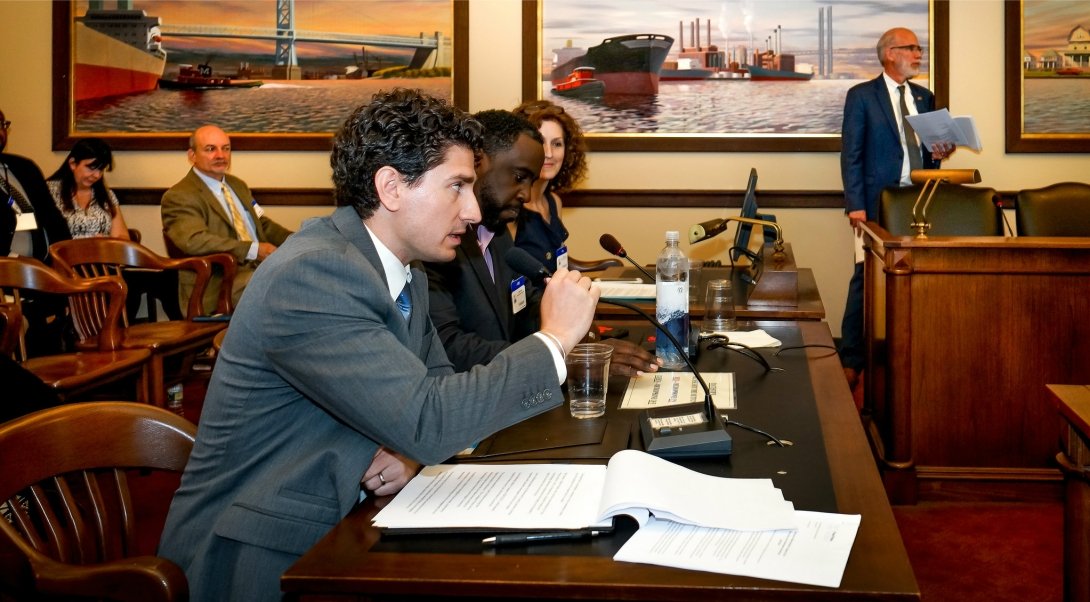
Free Press Action’s Mike Rispoli testifying in the New Jersey Statehouse.
Timothy Karr
After two years of campaigning, the statehouse passed the bill by an overwhelming bipartisan margin in 2018. Gov. Phil Murphy signed it into law, creating a new model for how public funding can support local news and keep communities informed.
But there was a catch: Murphy initially approved funding for the historic initiative, but after signing the bill he said the state funds were no longer available. We continued our advocacy efforts, and in July 2019, the state allocated up to $2 million in funding for the consortium.
This investment will allow the nonprofit to begin its crucial work. The newly created organization is a collaboration among five of the state’s leading public higher-education institutions: The College of New Jersey, Montclair State University, the New Jersey Institute of Technology, Rowan University and Rutgers University.
We can’t wait to see what the consortium will yield in its inaugural year.
Taking root in other states
The success of our Civic Info Bill campaign is serving as a model for how public funding can support local journalism. Lawmakers and innovators who have witnessed the decline of local news in their own states are now taking action.
We’re sharing what we learned in New Jersey with allies in Colorado, Massachusetts and Ohio, who are exploring their own paths to ensure people have the news and information they need.
The newly launched Colorado Media Project is exploring public-policy solutions to strengthen local news in the state, with News Voices playing an advisory role.
Policy Matters Ohio released a report in July that looks at how declining local news has hurt communities throughout the state. The report cites the Civic Info Bill campaign, saying “state legislators should follow the lead of their counterparts in New Jersey.”
And in Massachusetts, we joined the Boston Institute for Nonprofit Journalism and other local allies to testify before a legislative committee about a proposal to study the impacts of local media consolidation and craft solutions for underserved communities.
Showcasing the real voices of Atlantic City
At the first News Voices public forum we held in Atlantic City in 2015, participants discussed the national media’s relentlessly negative portrayal of their community. This wasn’t the Atlantic City they knew.
In the years since, we’ve continued to hold conversations with local residents, and in 2019 we invited the group ivoh (images & voices of hope) to hold a workshop on restorative narrative — stories that highlight strengths, healing and growth — for community members and journalists. All of this work culminated in Stories of Atlantic City, a collaboration between Free Press, the Center for Cooperative Media, ivoh and Stockton University.
The project’s premise was simple: A group of community members would scour Atlantic City looking for stories of strength and resiliency, and a group of five media partners would tell those stories using a restorative-narrative framework.
The collaboration produced 10 powerful stories and videos. One centers on a barbershop that serves as a hub for the community. Another profiles immigrants from Albania, Bangladesh, Mexico and other countries who run local businesses. Still another explores the declining local interest in baseball.
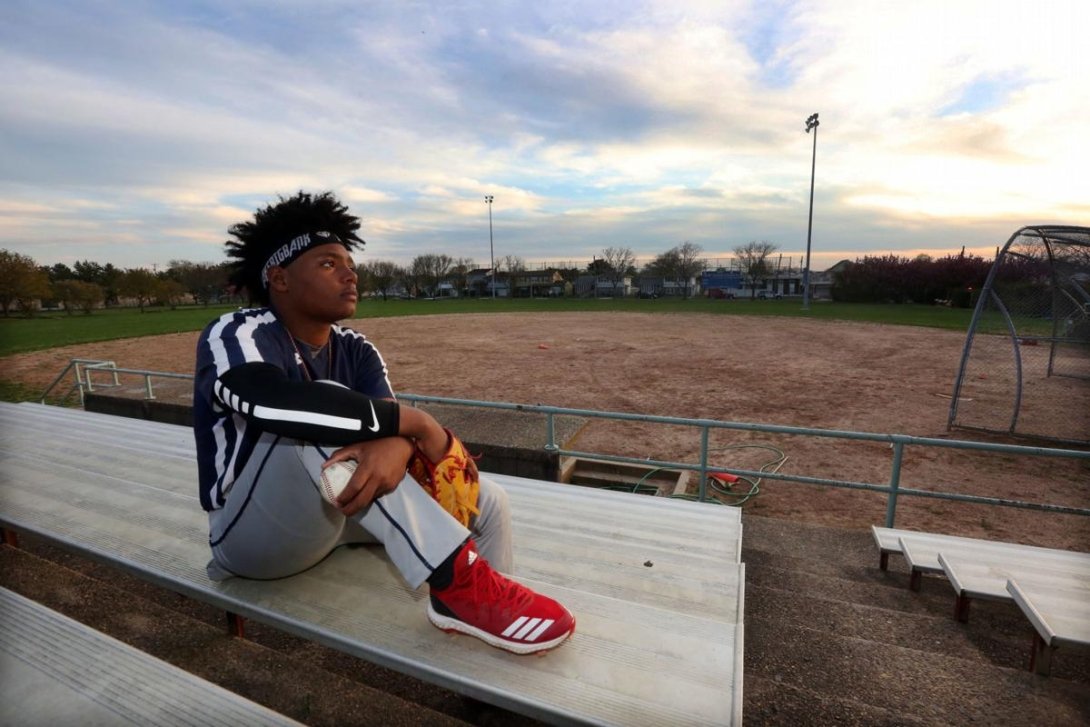
Jared Avril is one of the few Black players on the Atlantic City High School baseball team. He was featured in the Press of Atlantic City’s contribution to the Stories of Atlantic City series.
Vernon Ogrodnik, Press of Atlantic City
When the stories went live online, residents gathered at a launch party to celebrate the project. All of these inspiring pieces show the real Atlantic City and counter the dominant (and harmful) narrative about the city.
Community member Amber Hamlett said news outlets need to keep telling stories of resilience. “When we share our truths and listen and receive others’, that’s how we grow; that’s how we move forward.”
Making change at Newark Public Radio
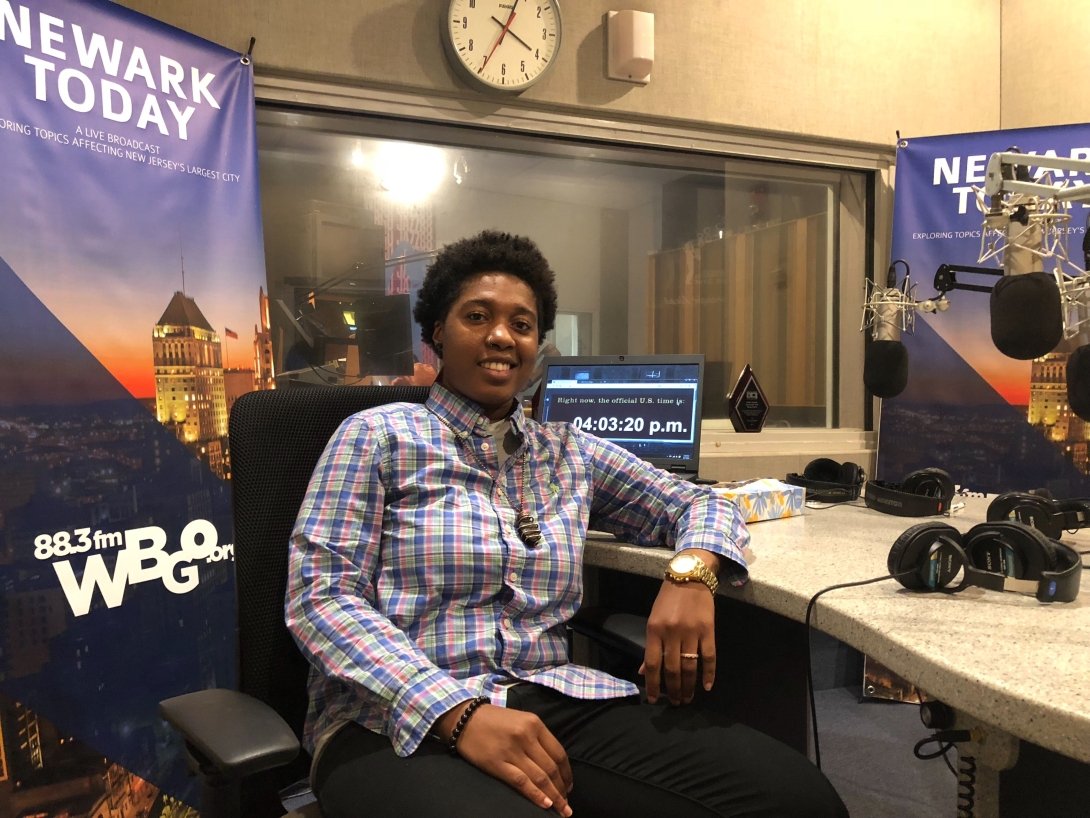
Newark resident and News Voices Engagement Fellow Brit Harley will work inside WBGO’s newsroom during our pilot project.
In too many communities, news outlets don’t reflect the range of residents they serve.
That’s why we’re so excited about our new partnership with Newark Public Radio (WBGO-FM). The News Voices Engagement Fellowship is a year-long pilot project. In July, we collaborated with WBGO to embed a local organizer in the station’s newsroom, with the goal of elevating underreported stories and strengthening the outlet’s relationships with community members.
Our inaugural fellow, Brit Harley, has a rich background in youth organizing and advocacy and will work to ensure that local-news coverage better reflects residents’ perspectives, experiences and expertise. Part of this process will involve creating opportunities for community members to participate in newsgathering.
Working alongside Free Press and WBGO will be a community advisory board that will help Harley build relationships across the city.
Diving deep into North Carolina
Free Press launched News Voices: North Carolina in 2017 — and after two years of deep relationship building, exciting new collaborations are blossoming. We’ve been most active in Charlotte, where we’re forging relationships between residents and reporters that are already transforming the city’s local news.
Teaming up with the Charlotte Observer
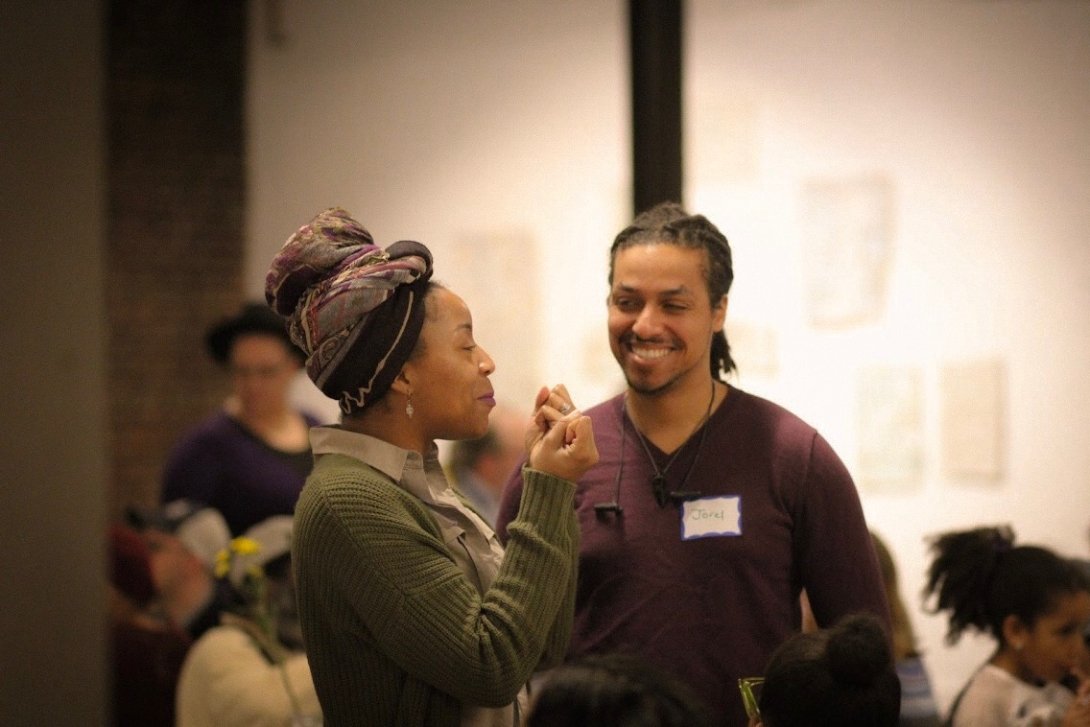
Community members discussed housing, displacement and race during our first public event with the Charlotte Observer.
Li Horne, Just Move Photography
We’ve worked with editors and reporters from the Charlotte Observer for more than a year, hosting ongoing meetings with local leaders about ways the newsroom could better serve residents. And early in 2019, we decided to engage more residents in those conversations and shape them according to community interest.
Our first public forum featured a screening of a Charlotte Observer documentary about the destruction of Brooklyn, a once-thriving Black neighborhood in the city that was destroyed due to “urban renewal.” Afterward residents sat down with journalists to discuss questions about housing and displacement.
During a Q&A, there was pushback when one journalist said they don’t cover Black communities enough. “Oh no,” one participant said, “you cover the Black community but you only do it through the lens of crime.”
Ensuring that reporters hear and respond to such important concerns is essential to our collaboration with the Observer. The paper’s editors and reporters are finding ways to integrate community voices into the way they work, which is shifting the culture of how news happens in Charlotte.
Listening to immigrant communities
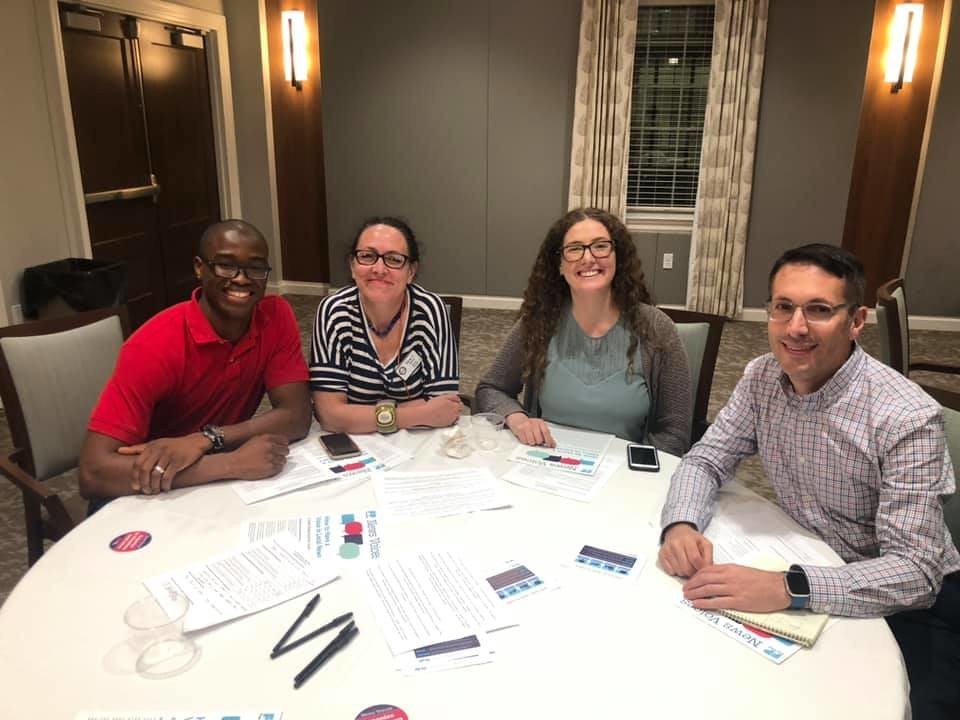
Participants in our conversation about immigration were a mix of immigrants and people born in the United States.
Erin Barbee
Later in the year, we partnered with the Observer on an event focused on immigration — and invited journalists from Enlace Latino, Latino Rebels and Norsan Media to join our conversation with community members.
Attendees were a mix of immigrants and people born in the United States. We devoted most of the event to small-group conversations exploring questions about how the Observer — and Charlotte as a whole — could best serve immigrants, refugees, migrants and asylum seekers. One of the most important takeaways was that in Charlotte, “immigrant” is synonymous with “Latinx”. As a result, immigrants from other parts of the world are made invisible.
The journalists present also began talking about how their outlets could collaborate, and how newsrooms with greater resources could lend capacity to smaller outlets.
TRANSforming local news
Earlier this year, the Charlotte Observer produced a five-part series called #TeamPregnantDad. The stories highlighted Liam Johns’ experience navigating pregnancy as a Transgender man in Charlotte.
The series created a buzz in the city, so Free Press teamed up with the Observer and several community groups to host an event during Pride Week.
This powerful gathering explored how Charlotte media can reflect the full gender spectrum in its coverage. The event drew local residents who identify as Transgender, gender nonconforming and non-binary, as well as people seeking to be allies.
Conversations ranged from how to provide real data and information about the harms Transgender and non-binary people experience, as well as calls to tell stories about the inspiring activities of Charlotteans outside of the gender binary.
In all of our Observer collaborations, Charlotte residents are developing relationships, newsroom knowledge and a deeper understanding of the newsgathering process in ways that help them build power with and for their communities.
Fostering local leadership
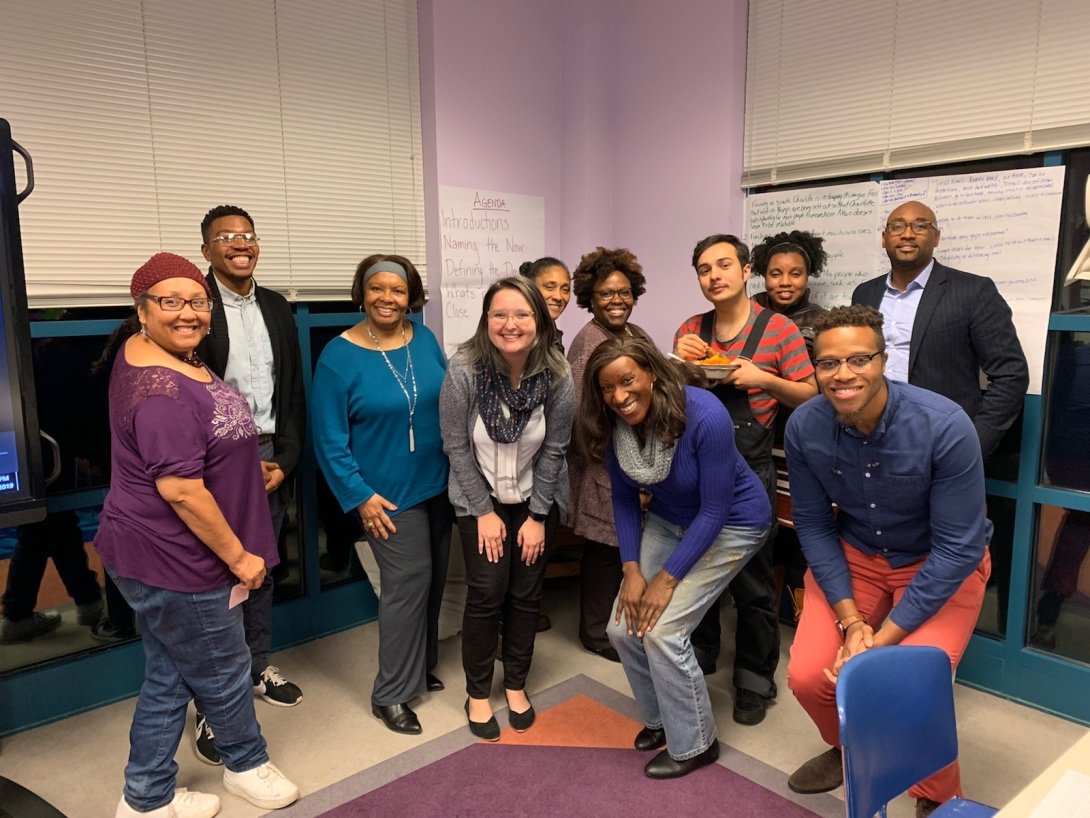
Community members who participated in our library series learned how to nurture relationships with reporters and have a voice in the future of their local news.
Chantez Neymoss
We partnered with the Charlotte Mecklenburg Library to host a three-week series on the future of local journalism. A variety of people attended, from pastors and gas-station employees to college students and retired Charlotteans. The workshop series moved participants from envisioning the kind of local news they need to pinpointing actions they can take to have a greater voice in local media.
Participants raised a number of important issues, ranging from concerns about representations of people of color to difficulties distinguishing between fact and misinformation. We brainstormed about concrete ways to nurture relationships with local newsrooms, giving people the tools they need to begin making change.
Building Black community
People who took part in the library series helped organize an event we co-hosted later in the year on strengthening Black community in Charlotte.
About 30 residents and journalists broke into story circles where people shared their experiences of living as Black people in Charlotte. Participants were able to express vulnerability during these conversations.
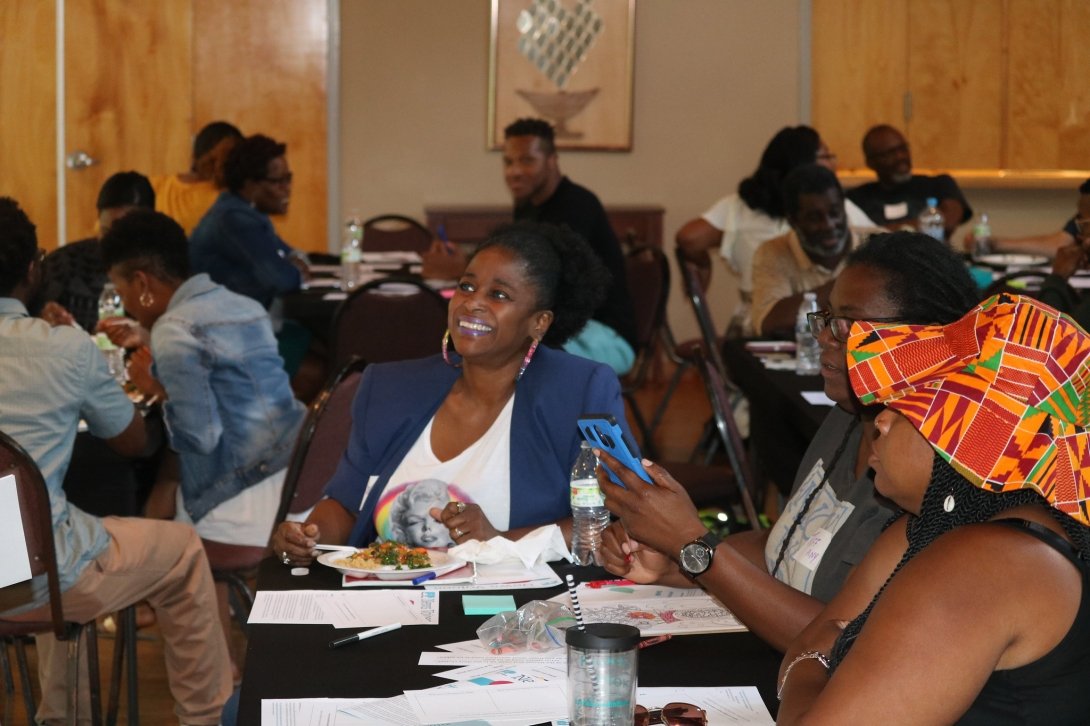
Our library-series cohort helped lead our discussion about strengthening Black community in Charlotte.
Frederick Murphy
Later we discussed the themes that arose in the story circles and brainstormed about ways local media could better respond to community needs and cover topics ranging from Black-owned businesses to building generational wealth.
To build on the success of this event, we’re figuring out ways for the library cohort to facilitate other local gatherings and collect feedback from fellow community members about their visions for local news.
Lifting off in Philadelphia
This year News Voices brought its unique approach to Philly via Organizing for Neighborhood News, a six-month pilot project that trained and mentored community members and student journalists to work with fellow residents, develop stories, and shift away from coverage that stigmatizes people of color and others.
We also trained reporters, producers and newsroom leaders from outlets across Philadelphia on using organizing tactics to nurture relationships with community members, understand what issues are important to residents and produce more impactful journalism.
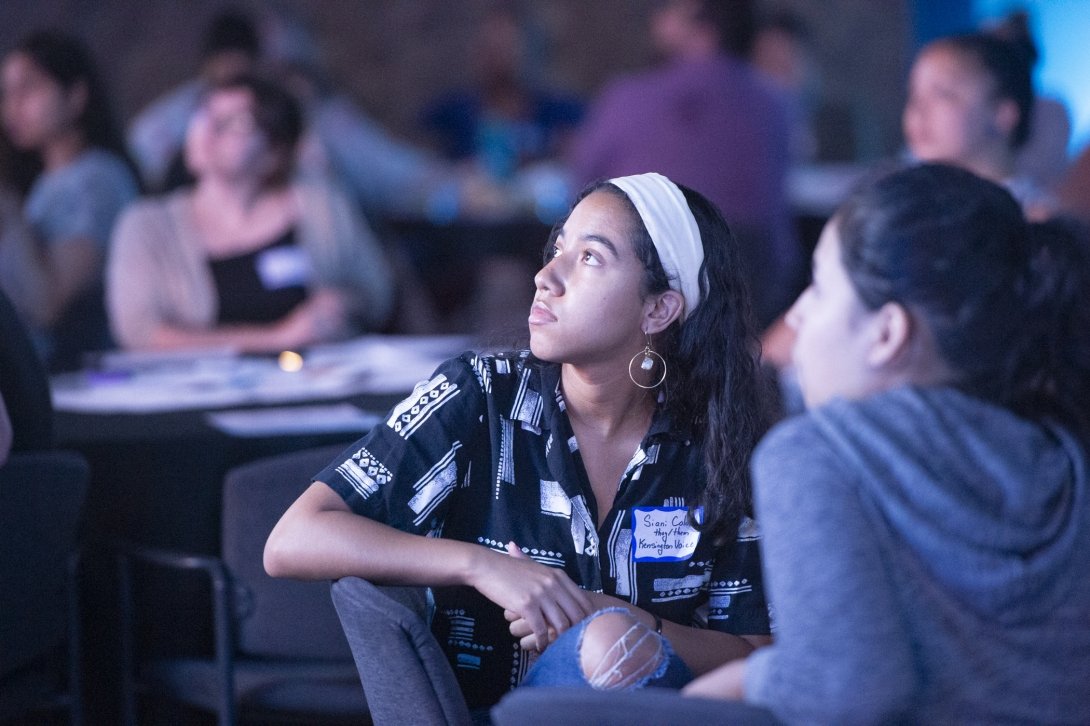
The event celebrating Organizing for Neighborhood News explored how community members and newsrooms can continue to work together to strengthen local news.
Jonathan A. Wilson, WHYY
Organizing for Neighborhood News was a collaboration with Germantown Info Hub, Kensington Voice, The People’s Education Center and WHYY, with the support of the Lenfest Institute for Journalism.
“This project allowed us to … expand our online reach and deepen our roots in the community,” said our partners at Kensington Voice. “We also learned from Free Press to focus more on engagement and less on content. Toward the end of the project, we realized that it was more important to the community for us to be present — even without the goal of finding and writing stories — than it was for us to publish.”
At the conclusion of the project in June, we held an event exploring how community members and newsrooms can continue to work together to strengthen local news and make it more responsive to and representative of city residents. We’re now working with allies to determine our next steps.
Looking ahead
The changes we’re fostering in New Jersey, North Carolina and Philadelphia are drawing attention around the country as newsrooms realize that if they invest in their communities, their communities will invest in them.
Community organizing is slow work. Building trust with and among local residents takes time, patience and deep listening. But our approach is yielding rich results, and is creating a future where local journalists and communities work together to tell the important stories of our lives.
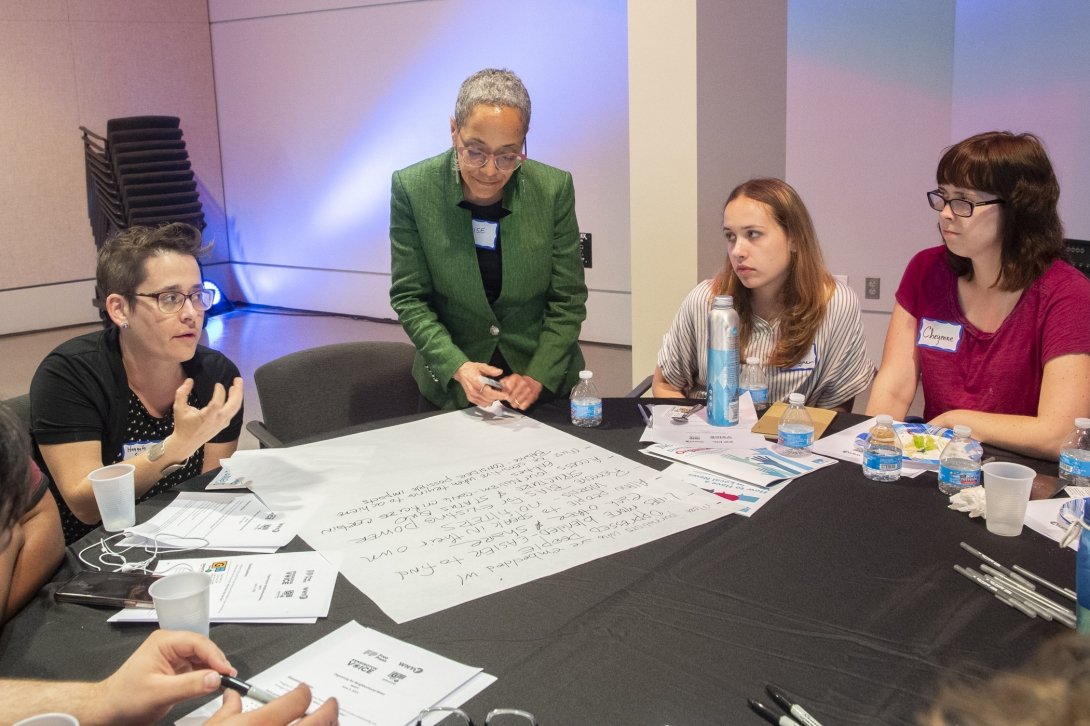
Jonathan Wilson, WHYY
We’re already making a powerful impact in New Jersey, North Carolina and Philadelphia and want to partner with more communities, collaborate with more newsrooms and continue campaigning for innovative policy solutions.
You can help build the momentum to transform local news by supporting this crucial work today. Thank you!